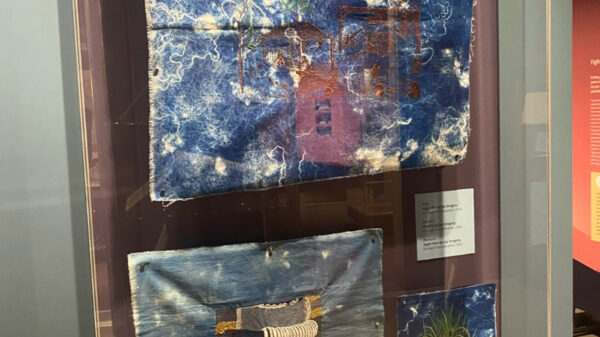Staff Writer Aleksa Andrejevic examines how our internalised perceptions of history shape our notions of power and place in the wider world.
Professor Richard Drayton from King’s College London once wrote that “how we tell the story of the past has never been an innocent business. It is especially burdened with ethical challenges where history is linked to policy.” Indeed, history is not merely the study of the past but it is also the study of the present and the way we see ourselves in the world as people. Politics and history are, for better or for worse, intertwined with one another. For centuries, history has been used as a discipline to tell the story of the world we live in and the roots of power held by certain civilisations, but how much has this fuelled the assumptions that we have today about our own place in our country and the outer world?
At the time of writing, from my house in Vauxhall on 11 November, I can see the Pro-Palestinian march chanting for a ceasefire with figures such as the former Leader of the Opposition, Jeremy Corbyn, and the former Shadow Chancellor, John McDonnell, making speeches to thousands of protestors. When I was in the crowd, I saw men, women, children, elderly people all of a diversity of faiths wearing poppies and waving union jacks alongside Palestinian flags. It had to be the most diverse protest I had ever witnessed in my life.
With all that being said, I knew that there were people in Britain who believed that these protestors were foreigners or extreme socialists simply driven by a hatred for the British nation. For them the protests were seen as a symptom that the British way of life was being threatened by uncontrolled immigration. The fact that the former head of the English Defence League (EDF), Tommy Robinson, was ‘defending’ the Cenotaph in Whitehall against the Pro-Palestinian protestors and the then Home Secretary was questioning the independence of the police, shows us how the assumptions underlying our identity as British subjects fogs much of the realities of the world around us and our perceptions of them. The writing of history has a large role in creating this issue.
Let us take the example of Armistice Day. In some way, one can argue that Tommy Robinson was ‘defending’ the memory of the most diverse army in human history. A British Army which represented an empire that once ruled over the majority of Muslims on the planet and of which around 400,000 served in the Great War. Tommy Robinson, a considered Islamophobe, was protecting a memorial which represents all the people he despises in Britain today. Whilst the British Empire was built on social hierarchies and racialisation (especially in the relationship between Britian and her colonies), it was an empire which knew the importance of managing different cultural communities in order to maintain its legitimacy. An example of this would be the foundation of the Anglo-Muhamedian Law which was created in order to bridge the gabs of legal knowledge between the types Islamic judiciary systems and British Law. Nile Green’s Islam and the Indian is a great book to get into this topic in greater detail. This is something that you wouldn’t dare hear from Mr Robinson’s mouth now, nor will you hear it be promoted from right-wing populists who look back nostalgically to empire. Another question that needs to be answered is how did supporting peace in Palestine become a condemnation of those who died in war? How did populism manage to generalise all of the views of the fallen to fit their own interests against the Pro-Palestinian protests?
We have gone from a form of ‘universal’ history, which saw British identity as a connection to the outer world, to an inward exclusivity of national history. In my view, our urge to write history in regional and national perspectives, rather than by global perspectives, has influenced how we see ourselves in the great story of history. Our views of the world are influenced by the methods of how we write history and the relationship historical writing has with power and legitimacy in the modern world.
Where does the historian write from?
History is power. In R.G Collingwood’s book The Idea of History, he introduces the origins of how history was perceived in different ways. In much more detail than you would find in this article, he splits the development of history into three stages: theocratic history, history through the eyes of Christianity and Post-Enlightenment History.
According to Collingwood, theocratic history was connected to the Greco-Roman historiography of the ancient world. It can be seen as a ‘quasi- history’ in comparisons to how we write history today. Whilst today’s historians write in the structure of arguments, comparisons to other work and rich historiography, Ancient Athens and Mesopotamia saw history as the story of ‘divine actions’. The stories of how hierarchies of society acted in service to the orders of the Gods in the Ancient World. The actions of human beings was not the main goal of this history, but it was an asset in trying to create mythical stories which facilitated the divine providence of the Gods. Two examples of this method of history can be found in Homer’s The Iliad and The Odyssey as Collingwood describes how Homer was connecting events, myths and the story of divine action into these two books.
Colingwood also discusses the historical approaches through Christianity which became popular in the fourth and fifth centuries AD in Europe. Here, Collingwood writes that ‘according to Christian doctrine, it is inevitable that man should act in the dark without knowing what will come of his action’. This approach to history focused on the protection of ‘darkness’ in historical research, which had the objective to keep the imagery of a Christian world awaiting salvation. This reached its peak with Sir Walter Raleigh’s book A History of the World (1614) in which he began the book with the Biblical story of the Garden of Eden, then he proceeded to bridge this story with the physical world by discussing the story of Abraham and lastly ended with a history of the Roman Empire.
Post- Enlightenment History is built on the foundations of rationality at a time in the 18th century when figures such as Immanuel Kant and David Hume had been developing the field of empirical research. This approach to history was further developed by Leapold Ranke’s ‘The Theory and Practice of History‘ in which he created the foundations of primary source research in order to know how “things actually happened [wie es eigentlich gewesen]”.
These varying approaches to history created different interpretations of how we should look at the past and from what lenses we should wear when studying it.
Another way in which History has been divided is through space. There are the fields of: Universal/World History, National History, Regional History and Local History. These fields of history are different in how they prioritise their approaches to historical analysis but they also have a diversity of methods which they employ to approach their own respective disciplines.
Whig historiography approaches historical development through the lenses of global progression and is influenced greatly by enlightenment principles around the advancement of Western Civilisation. In the Victorian period, one can look at John Seeley’s Expansion of England (1883) as a key example of Whig history. The belief of the British expansion of liberty, the Rule of Law and progressive values had long been a key feature to studying the development of the world for the Victorians. Whig history was intertwined with imperial history which by the early twentieth century had become an important feature in teaching the subject at a time when the British Empire had reached its zenith. H.E. Egerton’s Federations and Unions within the British Empire (1911) is an example of this method of applying Whig history and imperial history together as it interlinks the advancement of Britain to the advancement of the peripheries of Empire.
The reason I reference Whig history is because its origins were built on objectives of empire and its perspectives of history were linked to their understandings of power and legitimacy in the world order. For example, take the Hoover Institution’s very own Professor Niall Ferguson. Ferguson’s book Empire: How Britain Made the Modern World (2003) has been for over 20 years a beacon for ‘New Whig history’. It tells a story of opposition to post-colonial revisionism on the British Empire and argues that we hold a massive debt to the Empire itself.
His book was certainly a book of its political time. During the War on Terror and the Invasion of Iraq, America needed a philosophy to uphold their imperial ambitions in the Middle East and Ferguson would achieve this by connecting the latter book to his next book Colossus (2004). This book discussed how the United States is an imperial power and that it must learn from its imperial predecessor, the British Empire, in order to be a successful imperial hegemon in the modern world.
Another connection to this phenomenon of new Whig historiography can be seen with Nigel Biggar’s Colonialism: A Moral Reckoning (2021), which describes how ‘anti-colonial’ academics in Universities have accepted certain arguments in order to the further develop their academic careers. It is very much a book that has tried to tap into the ‘Culture Wars’ and one which has attempted to dispute the progression of imperial historiography which, in his eyes, have moved down the path of anti-colonialist view points.
It’s no coincidence that these books came out at this moment in time respectively. It was E.H. Carr who argued that history is written to not only tell the story of the past but to legitimise the world that we wish to envision. Ferguson and Biggar’s work have been used by many as a benchmark in attempting to legitimise the belief that the end goal for humanity needs to be the expansion of Western Civilisation and its ideals. These works of history, influence how the public see themselves in the world and what our values should be.
Post-colonial historiography in national/regional history is also another field which has contributed to the ideas of isolationism and a detachment from the rest of the world in the minds of many in the West. Let us first start with the principles of national/regional history. They focus on the historical evolution of a selected geographical location and it places the people of this area as the main figures of which History evolves around. A great example of this could be Peter Mansfield and Nicolas Pelham’s A History of the Middle East (2013).
When I was a child, I studied “International” history (i.e., European history) and Maltese History in Malta. Both sections of history focused heavily on the notion that the actions of the people within these regions and nations played the main role in forging the modern world. Thus, it legitimised the belief that our civilisation and people were uniquely important to the development of the modern world and our own region as a whole. Post- colonial historiography has done much in the late twentieth century to tell the stories of the colonised people and the development of the periphery of empire but it too has contributed to the idea that one’s national historiography is written as a story of how the natives made their country. Thus, it has been argued that this historical discipline has portrayed the main character which advanced historical development as the native/ colonised. These methods of historical writing have reduced the importance of transnational and world history in how we as Europeans see ourselves in the world. So, what can transnational history and world history teach us? How can it be applied to change the way we see ourselves and the people of the world?
A Global Reckoning by World History
Transnational history is different to world history. According to Akira Iriye in Global and Transnational History, transnational history is in the business of transcending issues of the nation-state and focusing rather on the key features of history that effect all nation states globally. He references issues regarding humanity and its connection to nature, the definitions of beauty and truth, social justice, the struggle to protect memory and most importantly the influence of power in history.
World history is not only connecting the interrelationships between nation-states and their peoples but it is also focused on the underlying social and environmental relationships that we have with the rest of the world. It attempts to transcend the nation-state and focus more on the diverse set of people who live across the world. World history teaches us that the events that may influence one nation-state might have been influenced by multiple global factors. Why did I, in Malta, have to start my historical development by studying the French Revolution? Why did I have to start history by reading the influence of Western Philosophy and the Enlightenment on European history? Why hadn’t I learnt of Edward Said’s Orientalism or the histories of the non-European Empires of the East, such as the Mughal Empire, in my early years of studying history? The reasons are multiple, some reasonable and some more sinister.
What I believe is that history is written for legitimacy. It gives us a founded story on which we can base our views upon. It gives us purpose. It gives us meaning. It gives us identity. This is not to say these are necessarily bad qualities in themselves but they show that the writing of history influences all of us and if written outdatedly, it can create the type of Britons who cannot understand the modern world today.
Soceology and World History
Going back to the beginning when I was watching the pro-Palestinian protests in Vauxhall and the negative press they got from the UK Government, we can see how this question of teaching world history truly does matter. Muslims and their relationship with the UK is an interesting example of how our communities in Britain have failed to see the inter-connectedness of their culture with the rest of the Muslim world. The Islamophobia that we see in Europe and in Britain has been created through the racialisation of Muslim identities through false arguments that a Muslim holds certain qualities to themselves which are indifferent to the ideals of Western Civilisation. We can see how national history in the late twentieth century has created a world divided amongst perceived rival civilisations. This reality is sort of akin to Samuel Huntington’s Clash of Civilisations.
I am no sociologist, but I have been personally moved by the application of studying human interactions in society and their historical connotations. This week, I started reading an editorial book entitled Orientalism and its Interlocutors which discusses how architecture, art, and culture influenced in multiple ways the relationship between the British and the wider Muslim communities across Europe and the outer world. In this book, Mark Crinson writes that the construction of British Mosques in Britain was a process which showed the diversity of how Muslims and Non-Muslims perceived what a Mosque needed to look like and be used for. He demonstrated this through covering: their differing construction objectives and ultimate aims shaped through identity and upbringing.
Furthermore, Roger Brubaker wrote much on the evolution of the term ‘Muslim’ in defining Muslims of European immigration. He wrote that “as a category of practice, ‘Muslim’ is used to identify oneself and to identify others. (In the important case of collective self-identifications, it is used to identify oneself and others at the same time: to speak not just of or for others, to subsume others, along with oneself, into a collective ‘we’.)” Thus, we can see how even the term ‘Muslim’ can hold so many meanings beneath it and it is at this point we can see how old methods of writing history have failed to teach us about these issues.
Another important work which I have been trying to get to grips with is Tariq Modood’s journal article ‘Political Blackness and British Asians’ published in 1994. Modood argued that even social campaigners in the 1980s were wrong to initiate the umbrella term ‘Black’ in order to group all non-white British subjects together to fight racism. This was because the term seemed to focus heavily on the evolution of African- Caribbeans whose histories were very unique compared to the many other non-white British subjects. Asian communities began to become hostile to the theory of ‘political blackness’ (which was the idea that blackness symbolised ideology and unity amongst minorities against the white oppressors) as they no longer related to these communities anymore due to seven points of difference – read here.
I reference these works in order to show how history is not just the study of events but also the study of assumptions that underpin rationality and then enforce notions of legitimacy and power within history. History at schools have failed to focus on this key issue when teaching the meaning and utility history.
Conclusion
From this reading, we as students of history need to be more aware of the different approaches to writing history and to be sensitive in what methods we apply for studying the past. It is only by understanding the details of historical writing that we can truly understand how we currently view the modern world today. This means that historians must write for something that they aspire for, what world they envision to live in and challenge the traditions in which history and power have been interlinked. Thus, as historians, we have a duty to write not just for the past’s sake but for the world that we aspire to build from our knowledge of our previous experiences.
















